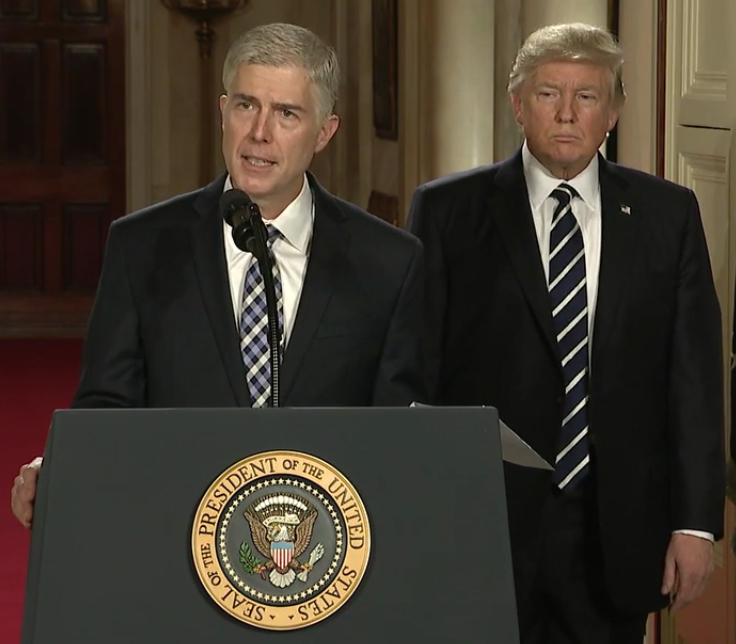
Photo Credit: White House, Public Domain
While all eyes are on Wednesday’s Supreme Court’s hearing on the legality of Donald Trump’s travel ban, which blocks entry to the U.S. by immigrants from six predominately Muslim countries, Democrats are savoring their latest victory: Justice Neil Gorsuch’s concurring opinion in a pro-immigrant Supreme Court ruling, Sessions v. Dimaya.
On April 17, Justice Gorsuch–whom one attorney, speaking off the record, said, “is trying to stake out his own claim as an originalist in the model of the late Justice Antonin Scalia” and should not be trusted as a liberal— nevertheless aligned himself with the liberal majority decision written by Justice Elena Kagan, sparing thousands of immigrants who have committed crimes in the U.S. from being deported by the Department of Homeland Security.
Gorsuch’s decisive vote broke the 4-4 deadlock that stymied the ruling before his Senate confirmation a little more than a year ago, in April, 2017, after Justice Antonin Scalia’s death left the Court’s 9th seat vacant.
According to Politico’s Josh Gerstein, “one open question is whether Gorsuch’s willingness to apply a more rigorous standard in the deportation case could carry over to other immigration-related cases, including the one on Trump’s travel ban.
“That seems unlikely based on Gorsuch’s stance last June when the Supreme Court allowed an earlier version of Trump’s travel-ban policy to take effect.
“Gorsuch joined with the high court’s most conservative members, Justice Clarence Thomas and Samuel Alito, in an opinion that said the travel ban should have been put into full force, despite lower court rulings putting it on hold,” Gerstein writes.
James Dimaya: a Convicted Burglar
The Obama Administration first brought the case against Dimaya, and Attorney General Jeff Sessions continued to pursue it, after the 9th Circuit Court of Appeals struck it down as too vague a law to adjudicate.
The case involved defendant James Dimaya, a California resident, who was a native of the Philippines.
Dimaya became a resident in 1992, at age 13, and committed two home burglaries in 2007 and 2009.
So Vague as to Violate Due Process
“While lawsuits challenging the Trump administration’s enforcement of immigration laws have been a hot-button issue—to say the least—the issue in Dimaya was extremely technical: namely, whether the term “a crime of violence,” as used in federal criminal law and incorporated by reference into federal laws requiring deportation, is so vague as to violate potential deportees’ constitutional right to due process of law,” writes Adam White in The Weekly Standard.
Separation of Powers is Sacrosanct to Originalists
“The unusual alignment of Gorsuch with the court’s liberal justices should also remind us that a case’s outcome–or more specifically, the partisan valence of the policy at issue in the case—can sometimes be a very poor proxy for the structural constitutional values at stake…” White continues.
Gorsuch believes that given the separation of powers so important to the integrity of the U.S. Constitution, “vague laws invite arbitrary power”, when the courts try to second-guess Congress’ intended meaning.
Scalia’s Precedent: Johnson v. United States
Adam Liptak of the New York Times says “in 2015, in Johnson v. United States, The Supreme Court ruled in an 8-1 decision with Scalia writing for the majority, that a similar law was unconstitutionally vague.
Justice Elena Kagan, writing for the majority…. said the reasoning in the Johnson case also “doomed the challenged provision of the immigration law,” Liptak writes.
Enormous Consequences for Immigration
Joshua Rosenbranz, a lawyer for immigrants at the center of the case, told Liptak, “This decision is of enormous consequence, striking down a flawed law that applies in a vast range of criminal and immigration cases and which has resulted in many thousands of immigrants being deported for decades in violation of their due process rights.”
A spokesman for the Department of Homeland Security, told Liptak the ruling would undercut “efforts to remove aliens, convicted of certain violent crimes, including sexual assault, kidnapping and burglary, from the United States.”
Trump tweeted that the ruling was a “public safety hazard,” and ”Congress must close the loopholes in the law.”
“Regardless of where Gorsuch takes this idea in the future, he deserves credit for following his principles to a fundamentally liberal result, writes Mark Joseph Stern of Slate.
“The justice channeled his inner Scalia, drawing upon a deep skepticism of the government’s power to capriciously punish citizens and immigrants alike.
“Will his reasoning help a future court annihilate the administrative state? Maybe! But it might rein in overzealous police and prosecutors, too. Progressives should savor their SCOTUS wins, where they can find them. And Dimaya is, without a doubt, a landmark liberal victory,” Slate’s Stern concludes.



Leave a Comment